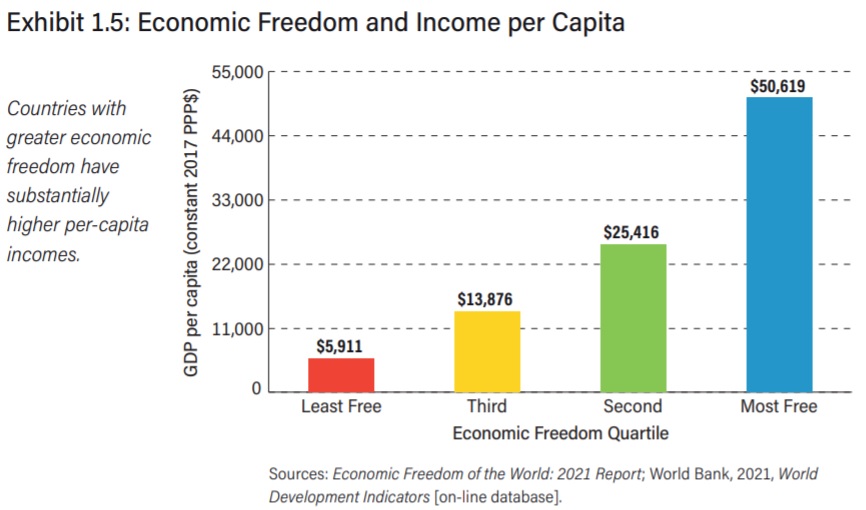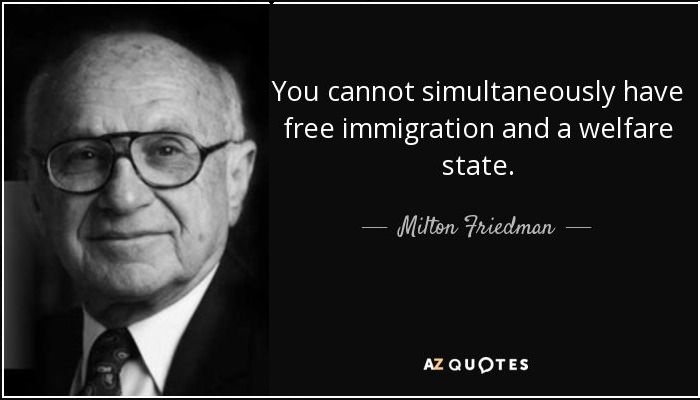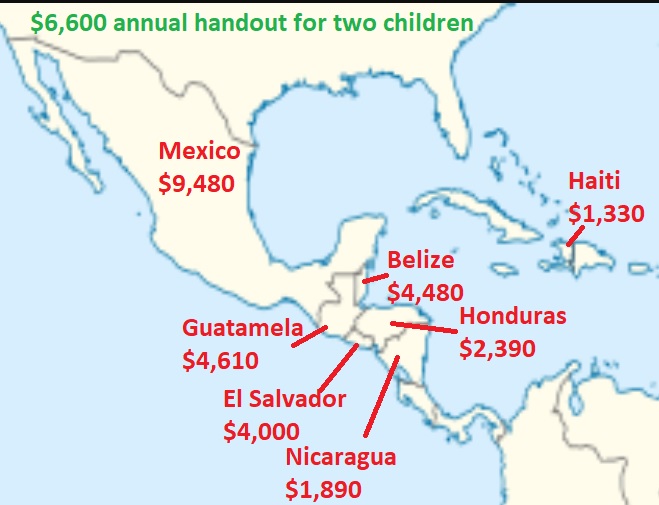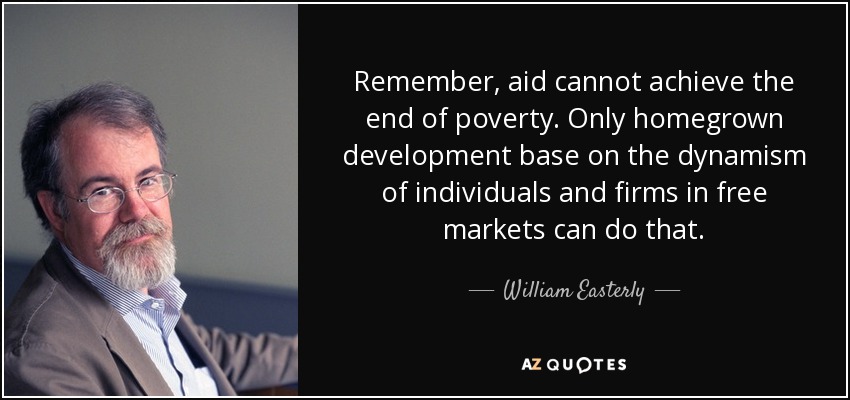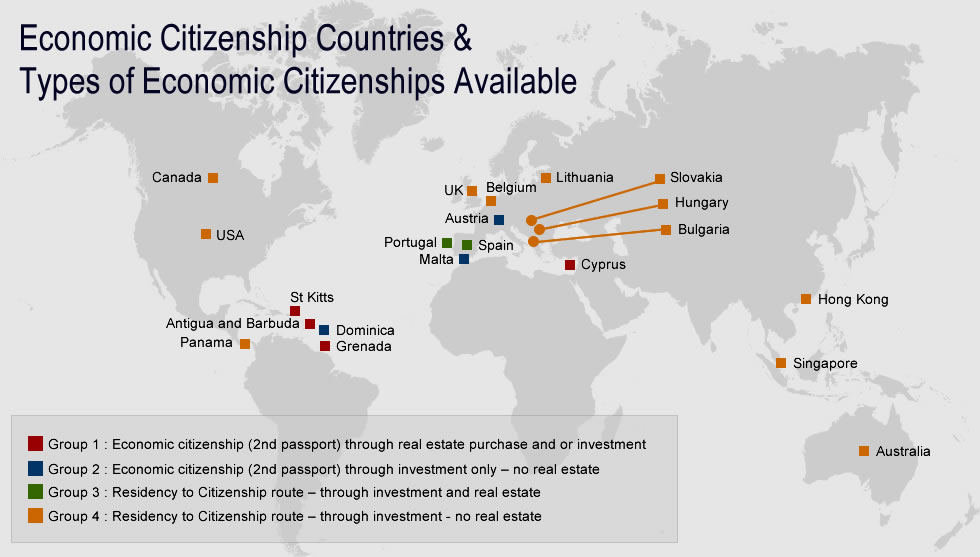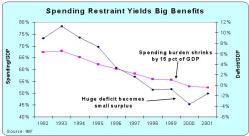While the overall issue of immigration is highly controversial and emotional, I’ve explained before that everyone should be able to agree that it’s a very good idea to bring in people who can be expected to increase per-capita economic output.
 The good news is that we have some policies designed to make this happen, including the H-1B visa for skilled workers and the EB-5 visa for job-creating investors. And if the data on median income for certain immigrant groups is any indication, we’re getting some good results.
The good news is that we have some policies designed to make this happen, including the H-1B visa for skilled workers and the EB-5 visa for job-creating investors. And if the data on median income for certain immigrant groups is any indication, we’re getting some good results.
Today, motivated in part by the fact that I’ll be participating next month in a conference in London on the topic of “economic citizenship” and therefore having to prepare for that discussion, let’s take a closer look at the EB-5 policy and why it’s a smart approach (by the way, I’m allowed to share a few discounted registrations since I’m a speaker, so contact me if you’re interested in the London event).
To put things in context, we’ll begin by reviewing a four-author study published by the National Bureau of Economic Research that looks at the growing effort by many nations to attract highly productive and capable immigrants.
Highly skilled workers play a central and starring role in today’s knowledge economy. Talented individuals make exceptional direct contributions—including breakthrough innovations and scientific discoveries—and coordinate and guide the actions of many others, propelling the knowledge frontier and spurring economic growth. 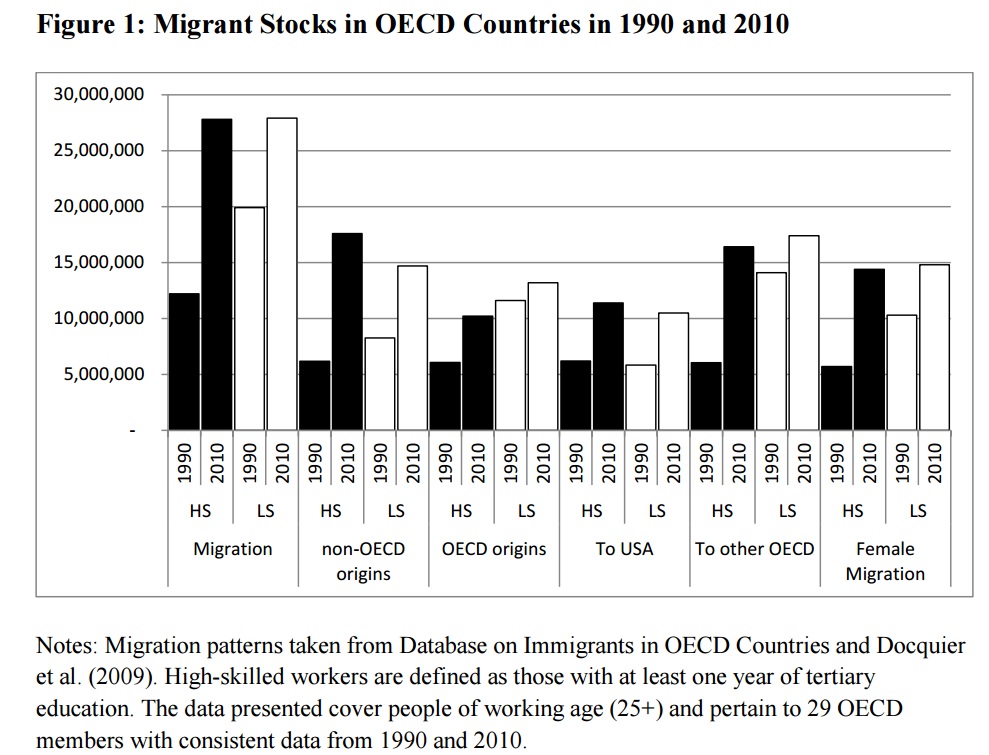 In this process, the mobility of skilled workers becomes critical to enhancing productivity. …In the 2013 World Population Policies report, 40 percent of countries reported policies to raise immigration of high-skilled workers, a large increase from 22 percent in 2005. …For recipient countries, high-skilled immigration is often linked to clusters of technology and knowledge production that are certainly important for local economies and are plausibly important at the national level. …When it comes to talented foreigners, a number of countries…implement recruiting programs. …Canada has been very active in targeting skilled migrants who are denied or frustrated by the H-1B visa system in the United States, even taking out ads on billboards in the United States to attract such migrants.
In this process, the mobility of skilled workers becomes critical to enhancing productivity. …In the 2013 World Population Policies report, 40 percent of countries reported policies to raise immigration of high-skilled workers, a large increase from 22 percent in 2005. …For recipient countries, high-skilled immigration is often linked to clusters of technology and knowledge production that are certainly important for local economies and are plausibly important at the national level. …When it comes to talented foreigners, a number of countries…implement recruiting programs. …Canada has been very active in targeting skilled migrants who are denied or frustrated by the H-1B visa system in the United States, even taking out ads on billboards in the United States to attract such migrants.
By the way, I can’t resist observing that the authors recognize that highly talented (and therefore highly compensated) people are very important for economic growth. Based on the tax policies they advocate, that’s something politicians such as Hillary Clinton have a hard time understanding. Heck, upper-income taxpayers are the ones who finance the lion’s share of big government, so you’d think leftist politicians would be slapping them on their backs rather than across their faces.
But I digress. Let’s look at what the study says about migration by those most capable of producing growth.
Observed migration flows are the result of a complex tangle of multinational firms and other employers pursuing scarce talent, governments and other gatekeepers trying to manage these flows with policies, and individuals seeking their best options given the constraints imposed upon them. …The number of migrants with a tertiary degree rose nearly 130 percent from 1990 to 2010, while low skilled (primary educated) migrants increased by only 40 percent during that time. A pattern is emerging in which these high-skilled migrants are departing from a broader range of countries and heading to a narrower range of countries—in particular, the United States, the United Kingdom, Canada, and Australia. …More than half of the high-skilled technology workers and entrepreneurs in Silicon Valley are foreign-born. …host countries may end up with high concentrations of high-skilled immigrants in particular occupations. For example, immigrants account for some 57 percent of scientists residing in Switzerland, 45 percent in Australia, and 38 percent in the United States (Franzoni et al. 2012).  In the United States, 27 percent of all physicians and surgeons and over 35 percent of current medical residents were foreign born in 2010. Immigrants also accounted for over 35 percent of recent enrollments in STEM fields, with very high proportions in specific areas like Electrical Engineering (70 percent), Computer Science (63 percent) and Economics (55 percent)… The global migration of inventors and the resulting concentration in a handful of countries have been particularly well documented. …the global migration rate of inventors in 2000 stood at 8.6 percent, at least 50 percent greater in share terms than the average for high-skilled workers as a whole. Figure 4 builds on WIPO global patent filings from 2001-2010. The United States has received an enormous net surplus of inventors from abroad.
In the United States, 27 percent of all physicians and surgeons and over 35 percent of current medical residents were foreign born in 2010. Immigrants also accounted for over 35 percent of recent enrollments in STEM fields, with very high proportions in specific areas like Electrical Engineering (70 percent), Computer Science (63 percent) and Economics (55 percent)… The global migration of inventors and the resulting concentration in a handful of countries have been particularly well documented. …the global migration rate of inventors in 2000 stood at 8.6 percent, at least 50 percent greater in share terms than the average for high-skilled workers as a whole. Figure 4 builds on WIPO global patent filings from 2001-2010. The United States has received an enormous net surplus of inventors from abroad.
The authors then consider the policies that different nations adopt in their search for GDP-enhancing immigrants.
…we then review the “gatekeepers” for global talent flows. At the government level, we compare the points-based skilled migration regimes as historically implemented by Canada and Australia with the employment-based policies used in the United States through mechanisms like the H-1B visa program. …The exceptional rise in the number of high-skilled migrants to OECD countries is the result of several forces, including increased efforts to attract them by policymakers as they recognize the central role of human capital in economic growth, positive spillovers generated by skill agglomeration, declines in transportation and communication costs, and rising pursuit of foreign education by young people. Among the resulting effects are the doubling of the share of the tertiary-educated in the labor force and fierce competition among countries hoping to attract talent. …One can explain certain aspects of current high-skilled migration patterns using this model. For example, the United States has a very wide earnings distribution and low tax levels and progressivity, especially compared to most source countries, including many high-income European countries. As a result, we can see why the United States would attract more high-skilled migrants…relative to other high-income countries.
By the way, I can’t resist making one minor correction. While we generally have lower taxes than other developed nations, we actually have a very “progressive” tax system. But US-style progressivity is the result of very low taxes on lower- and middle-income workers (no value-added tax, for instance), not unusually steep taxes on higher-income workers.
Returning to our main topic , the authors explain that developed nations either use a points-based system or an employment-based system when seeking to facilitate more high-skilled immigration.
Here’s how the the points-based system works.
Canada and Australia are prominent examples of countries that implement points-based systems for skilled migration. These programs select individuals based upon their observable education, language skills, work experience, and existing employment arrangements. …In the Canadian example, migrants need to collect 67 points across six categories. In terms of education, for example, 15 points are awarded for one-year post-secondary diploma, trade certificate or apprenticeship, compared to 25 for a doctorate degree. With regards work experience, six or more years of applicable experience receive 15 points, compared to 9 points for just one year of experience.
And here’s information on the employment-based approach, with the US being an obvious example.
The United States is the most cited example of a country that uses an employer-driven program for highskilled immigration, with the H-1B and L1 visas as primary categories (Kerr et al. 2015a). The H-1B visa allows US companies to temporarily employ skilled foreigners in “specialty occupations,” defined to be those demanding application of specialized knowledge like engineering or accounting. …Virtually all H-1B holders have a bachelor’s degree or higher and about 70% of the visas in recent years went to STEM-related occupations. India is by far the largest source country, accounting for about two-thirds of H-1B recipients in recent years. …most real-world regimes combine different features of points-based and employment-driven systems.
But the study notes that America also has a special system for bringing in ostensible superstars. Sort of a points system for the super talented.
Superstar talent rarely competes for H-1B visas, for example, but instead gains direct access to the United States through O1 temporary visas for extraordinary ability and direct green card applications of the EB-1 level for those with even more exceptional talent. …In effect, the US operates a points system for individuals with truly exceptional talents such as Nobel Prize winners, superstar athletes and musicians.
Now let’s turn the EB-5 program, which is another way that the United States seeks to attract those capable of making big economic contributions.
In part because the natural inefficiency of government creates opportunities for corruption in implementation, the EB-5 program has become very controversial. Some lawmakers even want the entire program to lapse when its authorization expires in December.
At the risk of understatement, I hope they don’t throw the baby out with the bathwater.
The Brookings Institution notes that Senators Chuck Grassley (R-IA) and Patrick Leahy (D-VT) want to impose stricter rules and micro-manage how the investment occurs.
It also raises the minimum investment amount to $800,000 within a [targeted employment area] and $1.2 million otherwise. Most important for reaching the program’s economic development goals, however, are the bill’s new rules on defining TEAs. …The bill would revise the TEA definition to include rural areas, closed military bases, or single census tracts within metro areas with an unemployment rate at 150 percent of the national average. To further increase the effect of EB-5 financing, at least 50 percent of the job creation would have to be within the metro area, or within the county in which a rural TEA is located.
The business community doesn’t object to some stricter standards, as reported by The Hill, but wants the program to remain and wants it made permanent.
A coalition of business groups is pushing Congress to permanently renew a controversial investor visa program before it expires in September. …In a letter shared with The Hill on Thursday, those groups called on lawmakers to renew the EB-5 investor visa program with bolstered security and anti-fraud checks, adjustments to highly criticized investment incentives and streamlined visa processing. “Congress must not let this important job-creating program lapse, in large measure because of the immediate negative consequences to U.S. businesses and projects counting on EB-5 investment to create jobs for Americans,” wrote the groups to the Senate and House Judiciary committees. …The EB-5 program is responsible for more than $15 billion in investment and 100,000 jobs between 2005 and 2010, the coalition says.
Ike Brannon, writing for the Weekly Standard, worries that politicians will undermine the positive impact of the program with some back-door central planning.
That EB-5 program has succeeded at its intended purpose is not in dispute: A Brookings Institution study estimated that the program has created nearly 100,000 jobs along with over $5 billion of new investment since its inception. The current EB-5 program technically consists of two different pieces: The first is the original EB-5 visa program, which Congress enacted in 1990. Its intent was to help American business compete for foreign investment with countries like Canada and Australia, which had similar investor programs in place. …The overriding intent of the program has always been about job creation, anywhere and everywhere. Senator Paul Simon, a sponsor of the original EB-5 program, took care to emphasize that its purpose was first and foremost to attract entrepreneurs and spur job creation, noting that “neither the Senate nor the House bill established any sort of criteria about the type of business investment…As long as the employment goal is met, it is unnecessary to needlessly regulate the type of business or the character of the investment.”
But politicians love the “needlessly regulate,” so the EB-5 system has lots of red tape and Ike fears it may get even more.
Congress nonetheless attempted to spur some sort of geographic balance-cum-urban development with the creation of Target Employment Areas [TEAs], which consist of areas with high unemployment rates or rural areas outside the boundary of any city or town with a population over 20,000. In a TEA, the necessary investment need only be $500,000, so long as it creates the requisite number of jobs. …The problem with a federal top-down approach of this sort is that such a constraint could limit the efficacy of the program. …imposing a new rule that restricts how states designate Targeted Employment Areas will only make EB-5 more of a political football than it already is. Creating a welter of restrictions about where such investment can and cannot go would likely dampen the economic impact of the program.
A columnist for Forbes explains why the program should continue.
The EB-5 immigration visa may be the best immigration program the U.S. has to offer. Foreign investors…are putting up a minimum of $500,000 to renew and rebuild rundown urban areas and create jobs. It’s a legal way in for the kind of immigrant, a fortunate one, that tends to contribute to the neighborhood by bringing in money and jobs. …“EB-5 has economic benefits that doesn’t stop at the five hundred thousand dollars they need to invest to participate,” says Julian Montero, a partner in the Miami law office of Arnstein & Lehr. “It’s just the beginning of a more significant investment that will be made by these families when the come here. They’re going to private schools. They’re making good income. They’re paying taxes. And most of them start other businesses once here.” …The EB-5 has become a way for developers to attract foreign capital at low, project finance-style structured interest rates because the people giving the money are getting a prize: the right to live, work and study in the United States.
Perhaps most notably, even the International Monetary Fund recognizes the advantages of this type of program.
…economic residency programs were recently launched across a wide range of (generally much larger) European countries, including Bulgaria, France, Hungary, Ireland, the Netherlands, Portugal, and Spain. Almost half of EU member states now have a dedicated immigrant investor route. Also known as golden visa programs, these arrangements give investors residency rights…some advanced economies, such as Canada, the United Kingdom, and the United States, have had immigrant investor programs since the late 1980s or early 1990s, offering a route to citizenship in exchange for specific investment conditions… The inflows of funds to countries from these programs can be substantial, with far-reaching macroeconomic implications for nearly every sector.
The IMF article includes a helpful summary of nations that have programs to attract investors.

The bottom line is that there are many high-income and high-wealth people in the world (including the “super-entrepreneurs“) who would like to move to places that offer more stability, security, and opportunity. This creates a potential win-win situation for both the people migrating and the recipient nations.
The United States is already a big beneficiary of economic-based migration, but we could reap even greater benefits with a more sensible, streamlined, and expanded EB-5 system.
P.S. Zooming out to the broader issue of immigration and whether people want to come to the United States for the wrong reason, Professor Tyler Cowen of George Mason University has a very intriguing proposal to have open immigration with nations such as Denmark that have bigger welfare states than America.
P.P.S. Today’s column is about economic-based immigration. There’s also the issue of economic-based emigration. Sadly, the United States policy on allowing people to leave is even worse than France’s system.
P.P.P.S. If you want to enjoy some migration-related humor, we have a video about Americans emigrating to Peru and a story about American leftists escaping to Canada.
P.P.P.P.S. Remember to contact me if you’re interested in the London conference.
Read Full Post »
LGBT initiatives, income equality, labor activism and the end of fossil fuels. Profit is a dirty word. …bidenista hostility toward capitalism everywhere. …it will be tough to hold back the human tsunami crashing on U.S. shores. Economic freedom and development are the only humane solutions to the poverty driving these huddled masses. …The Washington Consensus was…a blueprint for fiscal discipline, privatization, tax reform, deregulation and trade and investment liberalization. …its remedies bore fruit. …neither protectionism nor the antidevelopment ideology of socialism is cost-free. The hardship hitting all sides in the migrant crisis is the high price of getting the economics of development wrong.
